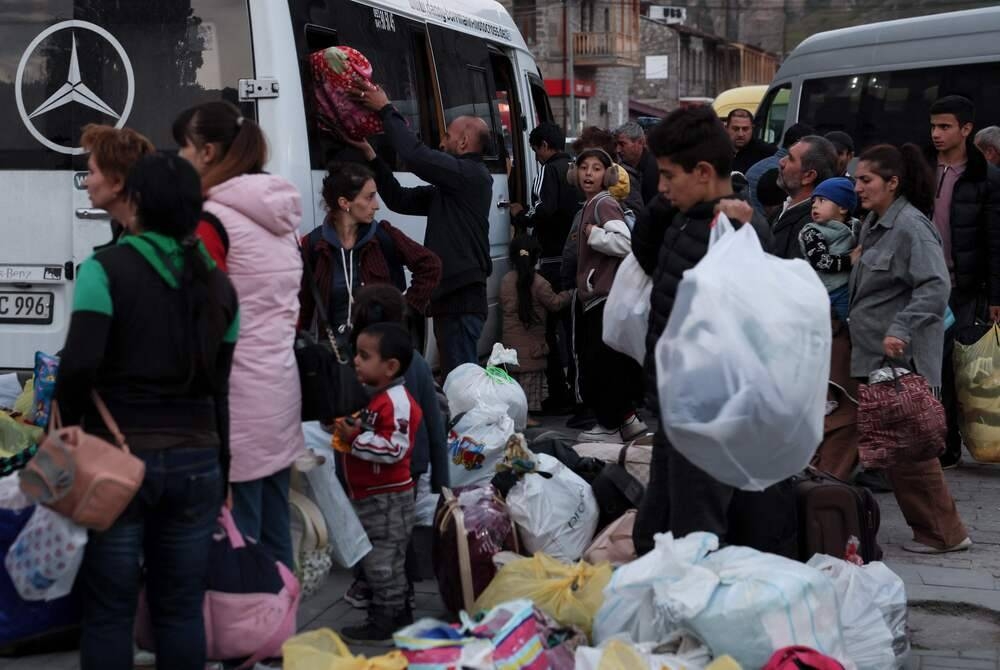Karabakh refugees burn cherished possessions on way out
THIBAULT MARCHAND
GORIS - The video on Angelina Agabekyan's phone shows her husband's military uniform and her son's toys burning over a bonfire they had set before fleeing Nagorno-Karabakh.
Agabekyan's little boy adds his bicycle to the flames melting his toys "so that the Azerbaijanis don't get to play with them".
The scene has been replayed across the ethnic Armenian enclave of Azerbaijan so often that the separatist government this week urged people not to burn things down before taking flight.
But refugees interviewed by AFP on the Armenian side of the border recount how they had set everything from their books to family albums ablaze to keep them from falling into Azerbaijani hands.
The cases highlight the ancient ethnic feuds that have been roiling a region inhabited by Armenians since the 2nd century BC - but which has changed rulers for centuries.
Predominantly Muslim Azerbaijan broke down the last vestiges of the Armenians' separatist dream with a 24-hour blitz last week that forced the rebels to capitulate and agree to dissolve their government by the end of the year.
The defeat set off an exodus of overwhelmingly Christian Nagorno-Karabakh families for Armenia that is likely to change the mountain region's ethnic and religious makeup for generations.
More than three-quarters of Nagorno-Karabakh's estimated 120,000 people had reached Armenia by Friday.
The flood of people snaking along the lone mountain road leading to Armenia is now slowly abating.
But the grief and anger are not.
A young girl named Larisa had a simple explanation for why she burned her family archives before leaving her relatively well-off home for a refugee centre in the Armenian border village of Goris.
"Family photos, our memories, the history books of our heroes - there is no question that the Azerbaijanis will defile them all," she said.
Many families at the Goris centre remember social media images of Azerbaijanis ridiculing their symbols after recapturing some of the lands they first lost in the 1990s in a six-week war in 2020.
There are also more violent images of desecrated corpses and prisoners being shot dead that raised the alarm of groups such as Human Rights Watch three years ago.
Azerbaijani prosecutors launched a formal investigation that concluded that most of the videos were either fake or staged.
But they also prosecuted four soldiers who were found to have desecrated Armenian graves.
The Harutyunyan family had memories of the 2020 war when it threw everything - including the family's military medals - into an oven.
Family grandmother Novella said the "whole village burned their uniforms" before fleeing in panic.
"We were told that if (the Azerbaijanis) saw our photos or uniforms, they would take them and we would be arrested," the 65-year-old said.
Novella's daughter Marine said enemy soldiers never reached her home in the village of Paravatumb.
But she said they occupied its surrounding heights and directed spotlights at their homes at night "as if we were under surveillance".
The bonfires are an echo of the infernos fleeing Armenian families set three years ago. AFP saw entire villages go up in flames then.
Last weekend, the Azerbaijani defence ministry released a grainy 34-second clip appearing to show a series of small fires.
It accused Armenians of setting fires "en masse" in the town of Aghdara.
The separatists' interior ministry later issued a statement urging families to "show responsibility and respect for safety rules".
One-time soldier and full-time mason Garri Haryumyan said he did not burn anything before joining the exodus.
But he did delete all the army photos - "even those of my dead friends" - on his phone as a safety precaution.
Azerbaijani border guards check the identities of men of fighting age in search of potential "war crime" suspects.
They reported the detention of a senior separatist commander on Friday.
War is "terrible," Haryumyan said.
"When it started, we said to ourselves that it was an opportunity to regain land," the 37-year-old recalled.
"But the imbalance was too big. They had all the weapons." His attachment to the family house he had built himself was so great that he decided to leave a message on its walls before leaving.
"Please, I've worked hard, don't destroy it," he wrote in Russian. - AFP












